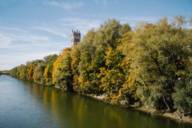
From organic cosmetics, fair trade fashion and cultural temporary-use projects to eco-social city tours and vegan restaurants - the Bavarian capital not only has one of the world's largest inner-city park, the English Garden, but also thinks green in every aspect. München Tourismus has compiled the following environmentally conscious travel inspirations for a diverse and eco-aware experience.
Sustainable aspects have been a cornerstone of Munich’s tourism for decades. Many of the city’s highlights can be easily explored on foot, with rental bikes and e-bikes, electric scooters and the popular rickshaws. For instance, a visit to the old town with Marienplatz (main square), Viktualienmarkt (food market) and Odeonsplatz (square) can be combined with the adjacent, vibrant Glockenbachviertel district. Munich tourism has also put together two city walking routes on which visitors can discover various neighbourhoods and their attractions, either from East to West or from North to South. The tours can also be shortened and combined.
In addition to an array of second-hand shops offering fashion, jewellery and even Bavarian traditional dress, there are large and small boutiques with climate-friendly labels waiting to be explored. Visitors can take part in the Green Fashion Tours and engage directly with sustainable designers, like those of Khala, a fashion collective housed in the alternative container village named Bahnwärter Thiel. Their colourful favourites are meant to contribute to better living conditions or colleagues in Malawi in the long run.
On a private tour (available for several quarters in German) through the culturally thriving Schlachthofviertel,(meatpacking district) or during an eco-social walk (available in English upon request), visitors can explore many well-known and lesser-known spots, where genuine sustainability is already put into practice. Here, guests also receive practical tips and tricks for an environmentally friendly visit. For instance, most of the city's cafés are happy to refill the thermos or coffee cups that visitors bring and with the RECUP deposit system in place, they can make a meaningful contribution to reducing plastic waste.
In the vibrant neighbourhood of Werksviertel-Mitte, creative minds are designing exciting ecological concepts like the Almschule (educational project) on the rooftop of WERK3. The social facet of sustainability comes alive during a barrier-free guided tour at the science and technology focused Deutsches Museum.
An impressive example for a success story of environmentally conscious entrepreneurship in Munich is the vegan and animal-free NKM “Naturkosmetik München“ (natural cosmetics), with its reusable bottle system. When she founded her company in 2019, 23-year-old Mareike Peters, who has always been closely connected to nature as the daughter of barefoot park operators, made it onto the Forbes list of the most successful young entrepreneurs in retail and e-commerce with her sustainable approach. Today, she oversees three shops in Germany. Shops like Servus Resi which specialises in packaging-free food, cosmetics and household goods follow a zero-waste approach, while at Halle 2 in Pasing, run by the Munich waste company management, items that are too valuable to be thrown away are rescued, recycled and sold.
The former quarters of the Gasteig cultural centre have undergone a vibrant revival with Fat Cat: theatre plays, performance installations, open studios and rehearsal rooms, dancing in the Black Box, exhibitions and a cultural roof garden are part of the programme.
Until 15 December, the Kunst Kioske campaign is transforming ten of the many vacant kiosks at the Munich underground stations into cultural hubs for the first time. Travellers waiting for their train can enjoy a variety of site-specific cultural projects – without fixed opening hours or admission fees. A classic is the annually held Tollwood Festival, which has been focusing on sustainability in both summer and winter for 35 years now.
If you prefer a nature experience, you don't have to leave the city: The Munich Botanical Garden provides a habitat for a multitude of bird and insect species, while the adjacent Schlosspark Nymphenburg (Nymphenburg Palace park) is known for its idyllic setting and rare plant varieties. The Museum Mensch und Natur is one of the most visited natural science museums in Germany.
Munich's eco-fresh culinary scene doesn't need to hide its virtues either: There are multi-award-winning vegan Weisswurst sausages from the Munich start-up Greenforce, which were first served at the Oktoberfest in 2022, or the completely vegan Buddhist cuisine at Soy Vegan and traditional Bavarian dishes at the vegan restaurant bodhi, serving meatless roasts and schnitzels. Even in the English Garden, which surpasses Central Park in New York City in size, the traditional Milchhäusl serves only organic food from Bavaria in its beer garden.
Visitors to the city can enjoy a resource-friendly stay at the Cocoon Hotels in the city centre, or at the barrier-free Scandic München Macherei which generates electricity from 100 per cent renewable energy and offers reusable packaging for take-away lunches. Another option is Hotel Augustin directly at Theresienwiese (Oktoberfest fairground), which was constructed from regional wood and covers its energy needs via its own combined heat and power plant. Furthermore, it has some of the room furnishings - such as the clothes hangers - produced in the workshop for the disabled.